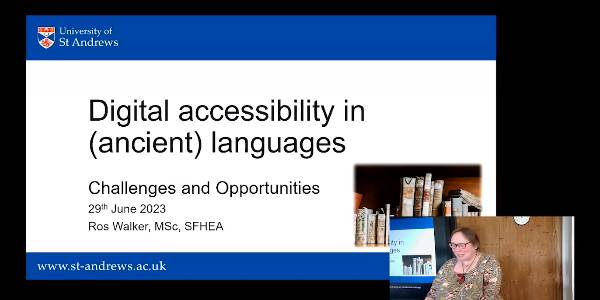
August 4, 2023, by Ben Atkinson
The Digital Accessibility Conference: Sessions Review Part 3
On the 29th of June 2023, Learning Technology hosted a Digital Accessibility Conference at the University of Nottingham. In this series of blog posts, we are reflecting on the conference and sharing reviews written by members of the team who chaired panels during the 2023 conference. In this final post in the series, Sally Hanford reflects on the long papers in sessions 1E and 2A.
Session 1E: Accessibility in (ancient) languages
Presenter: Ros Walker, University of St Andrews
This session was presented by Ros Walker, Digital Accessibility Adviser at the University of St Andrews
Ros spoke about her work trying to make a Latin course fully accessible for visually impaired students. She encountered challenges with text to speech software not recognising ancient languages, inaccurate OCR (Optical Character Recognition) and where there were multiple languages on the page. Formatting of the text from textbooks could also be problematic (particular languages which use tables, like Latin, where all of the tables needed to be re-formatted). The practical demonstrations of the issues were enlightening.
Ros had to spend a much greater amount of time trying to resolve these issues than she expected and had to renegotiate her other duties as a result. However, the mission to find a resolution has now become something of a passion as she finds out more and develops expertise in this specialist area. She plans to eventually publish the specific texts that she has worked on to rnib bookshare. The presentation highlighted the need for support from publishers and developers to achieve full accessibility.
Feedback from the students who were recipients of the alternative formats who, due to the amount of work involved, only had access to the materials shortly before the class was positive. They reported previously ‘feeling stupid’ which had a profound emotional impact. There was an impact on teaching staff too due to the huge amount of preparation time, and the complexity of delivery in class.
Ros wanted to issue a challenge to publishers to make texts for ancient languages accessible and to institutions to review if the way that these subjects are currently taught is fit for purpose, given the heavy reliance on textbooks.
Session 2A: Beyond Compliance: Collaborative Strategies for Promoting Digital Accessibility and Inclusivity in Higher Education
Presenters: Linda Marron & Andrew Billington, Edge Hill University
One of the key messages was that success depends on a whole community approach to changing culture. Edge Hill created and nurtured a network of accessibility enthusiasts who prioritised ‘getting the message out’ and bringing colleagues onto the ‘same wavelength’. A regular digital communication with accessibility updates was published widely to improve the reach of the accessibility message in the institution. There was space to celebrate achievements and an acknowledgement that academics might have different understanding of terms, might not feel that they have time or might not see the point in making changes.
Some changes that may have seemed at first glance to be minor proved to be impactful. For example, embedding awareness of accessibility into job descriptions, implementing small, short regular audits focusing on one aspect and introducing accessibility into all elements of the PGCHE.
A more major action was to turn off course copy when moving to Blackboard Ultra Virtual Learning Environment. This stopped people carrying over legacy documents and, along with Ally (A tool that gives a visual indicator of how accessible a document is), gave staff an incentive to review content before uploading.
Inclusive assessment was also mentioned, with an emphasis on the importance of addressing inclusivity at the point of assessment design rather than as an afterthought. Adjustments proved to be subject specific but the principle of students being able to negotiate how they show that they have understood the subject (reasonable adjustments) crossed disciplines.
Other actions were the introduction of compulsory training, and policies alongside templates for module and handbook programme guidance documents to include information about accessibility, student voice as well as course level accessibility statements.
Accessibility maturity models were used as a vehicle to obtain key metrics and measures to guide the journey.
Some other key messages:
Assistive tech useful to everyone. It is easy to overlook our own normative assumptions, but improving staff cultural competence by introducing small changes in our interactions can make a huge difference to the sense of belonging of our university communities. An example of a cultural difference given was the difference in expectation for eye contact between different cultures. The use of inclusive language can be seen as common curtesy rather than ‘political correctness’ (e.g. use the word ‘folks’ instead of ‘guys’ or ‘ladies and gentlemen’) and Spring, Summer, Winter breaks rather than specific religious festivals.
You can read all the posts in our series covering the Digital Accessibility Conference here on our blog:
No comments yet, fill out a comment to be the first

Leave a Reply